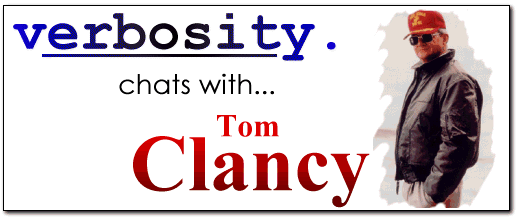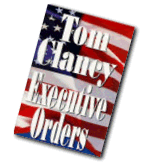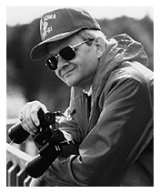

In looking
at the best-seller list over the past several years, it's a rarity not
to find the name Tom Clancy lingering somewhere near the top. Novel after
novel, Clancy manages to stir up a sense of adventure in the hearts of his
readers with tales of political intrigue and military mayhem. Since the
1984 release of The Hunt for Red October, Clancy has stunned his
readers with his sense-shattering plots and well-developed characters in
such novels as Without Remorse, Debt of Honor, and, his latest
chart-topped, Executive Orders.
Clancy has
also hooked up with
Red Storm Entertainment to produce a
line of computer games and simulations over the next few years. Mr.
Clancy recently took the time to do an e-mail interview with
verbosity about his upcoming projects and such. Here's what he had
to say...
 verbosity:
Can you tell us a little about how you got into writing your techno-thriller
novels? Any major influences or inspirations?
verbosity:
Can you tell us a little about how you got into writing your techno-thriller
novels? Any major influences or inspirations?
Tom Clancy: I write novels. "Techno-thriller" is a label put on me by some reviewer, and which I heartily reject. Were I to pick a single decisive influence, it would be Freddy Forsyth's Day of the Jackal. The book is perhaps the best thriller ever done -- and more than that, it redefined the thriller novel, converting it into a highly respectable genre. Then I asked myself, "Why are all the good thriller writers Brits? Why can't an American do it?" So I did, and I guess it worked.v: Are your books a sort of a "Walter Mitty-esque" exercise, with your heroic characters, such as Greer and Clark, acting as alter egos for yourself? Do you often base your characters on people you know or real national figures?
TC: I guess I learned this one from another Brit, Alfred Hitchcock. I don't write about super-heroes. I want my protagonists to be recognizably human, with real human concerns (paying taxes, going to Little League, assembling Barbie doll-houses). Some of my characters are based on real people. One's even based on me.v: When you create your villains, are they ever based on the villains we saw in the drama of the Cold War and conflict around the globe, or are they pure works of fiction?
TC: My villains are all wholly fictional characters. The reason is obvious if you think about it.v: Do you feel that the fall of the Soviet Union and other such political upheavals have left you without a ready-made antagonist for your novels?
TC: I wrote my last "Cold War" book ten years ago--and I haven't run out of villains yet, have I?v: Are there any of the movie adaptions of your novels that have irked you in any way? Ones that you thought were handled poorly? Do you generally have a fair degree of input in the adaptions?
TC: I really don't talk about this. My current working relationship with Paramount is excellent.
 v:
What can you tell us about your upcoming projects? What's next on your
agenda -- another novel, more technical writing? How about your computer
gaming-related projects with Red Storm Entertainment?
v:
What can you tell us about your upcoming projects? What's next on your
agenda -- another novel, more technical writing? How about your computer
gaming-related projects with Red Storm Entertainment?
TC: I never discuss books-in-progress. Red Storm Entertainment has four projects in development, but we're not yet ready to talk about them, either.v: It's often been theorized that you have access to information of a sensitive nature that most civilians may not. Is the technological and military information featured in many of your novels simply the result of careful research and the occasional lucky guess, or is there some truth to those theories?
TC: I have never seen a classified document, and I do not want to. I don't have a security clearance. The fact of the matter is that all the information I need is in the open media. You merely need to know where to look.v: What work would you say you're most proud of? Anything that you wish you'd done differently with one of your novels? Who would you say is your favorite character you've created?
TC: The thing I'm proudest of is fatherhood. I would not change any of my novels very much, though my prose always seems to have room for improvement. My favorite character? That's a tie between Jack Ryan and John Clark.
 v:
Are you involved greatly with the Internet? What do you think of the
growing global information community that seems to be forming in the world
today?
v:
Are you involved greatly with the Internet? What do you think of the
growing global information community that seems to be forming in the world
today?
TC: Not yet, but I expect I will be. The Internet cannot help but be a positive step for humanity. Progress is about information. Anything that makes information more accessible is a good thing. It really is that simple.v: What does Tom Clancy read when it comes time to sit down with a good book?
TC: Just about anything. Fiction, science-fiction, history, science. Anything.v: Where do you see yourself five years from now?
TC: If I could predict the future, I'd be working on Wall Street--well, not anymore. I would long since have retired.v: What's the one thing about yourself that you think would really surprise your fans?
TC: I'm a fairly ordinary guy who's been very lucky. I am where I am because of my readers more than from myself. Thanks, guys. I do appreciate it.
We'd like
to thank Mr. Clancy for taking the time to talk with us. Also, we thank
Mr. Doug Littlejohns of Red Storm Entertainment for helping us arrange the
interview. Be sure to check out Red Storm's
website and Tom
Clancy's site at Putnam Books.
This interview with conducted via e-mail and was composed by Kyle Scanlan, Jamie Rife, and Seth Waddell.